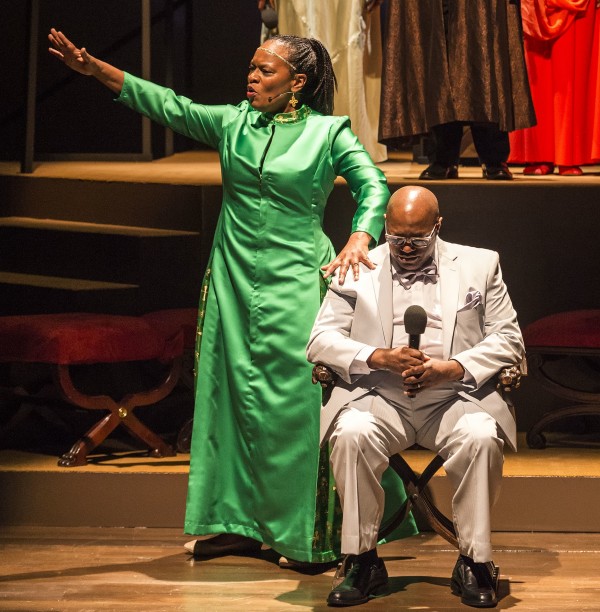Given the timing, content and string of traumatizing recent events that have spooked and scarred the nation — especially its African American communities — it is impossible to see the Ebony Theatre’s current production of The Gospel at Colonus and not connect the dots between myth and reality. And considering America’s anguished response to those events, it is impossible to remain unmoved.
But there is moved and then there is moved. The Ebony’s The Gospel at Colonus is a buoyant, expansive, celebratory affair, almost as stirring in its way as watching President Obama tentatively break into a chorus of “Amazing Grace” during his extraordinary eulogy for Clementa Pinckney at Charleston’s Emanuel AME Church after the recent massacre.
It is is nothing short of amazing, in that overused word’s seminal meaning, that, because of the timing, the show creates even stronger seismic waves today than it did 32 years ago when Lee Breuer (of Mabou Mines) and Bob Telson (who composed the music) were inspired to transpose the Robert Fitzgerald translation of the death of Oedipus, taken from the trilogy by Sophocles, to a Pentecostal black church.
The original piece was nominated for both a Pulitzer Prize and a Tony Award, but it has slumbered a good deal in the intervening years — only to rise again now as though no time at all had elapsed, which is both a pertinent societal commentary and in too many ways a sad one.

This production, staged with abundant spirit, zest and and logistical elasticity by Ebony Associate Artistic Director Andi Chapman, replicates several aspects of the original 1983 production. Some of the characters, for instance, are doubled, as they were in the original, which can be a little confusing since not all of the characters are. We have a speaking Antigone (the ever elegant and impressive Kim Staunton) and a singing one (Sharett Morgan-Harmon); a speaking Oedipus (Roger Robinson, strong and resonant) and a singing one: the accomplished singer/musician Ellis Hall, who is, indeed, blind, and is the Ebony’s response to the original singing Oedipus, who was collectively represented in song by the Blind Boys of Alabama, the five-time Grammy Award-winning gospel group.
As you can probably tell by now, this entire production was no minor undertaking. Casting always being the key to success, it is important to single out the many vocal standouts (and they are many): Hall, of course, first in line as the singing Oedipus; the big-voiced LaVan Davis as Choragos, a some time soloist and lead singer of the Choragos quintet that carries a lot of the vocal pleasures of the show; soloist Nicoe “Nikki” Potts, whose riffs on “Lift Me Up” raise the roof in a voice that recalls the vocal calisthenics of the great Mahalia Jackson, and Samuel Butler as the sweet-toned Balladeer.
Chapman has made a remarkable directorial debut at the Ebony with this show and she benefits from the help of Keith Young’s musical staging, especially when you consider that both of them are dealing with lots of bodies: an onstage orchestra of five musicians (Abdul Hamid Royal is the musical director), 15 members of the Los Angeles Young Adults of Gospel Music Workshop of America (under the direction of Tony Jones), and a cast of some 20 actors and singers. All of them completely fill up the spacious Ebony stage pretty much all the time. A simple but ingenious multi-level set by Edward E. Haynes’ accommodates the performers without strain, and provides a whiff of the show’s Greek pedigree with a couple of centrally placed broken columns.

Interestingly, the mostly clear and well-modulated sound design is by none other than Philip G. Allen (Cinderella, Jesus Christ Superstar, Chicago and UCLA’s Reprise series). Allen was the sound designer for Deaf West’s recent Spring Awakening at the Wallis in Beverly Hills, whose sound requirements were similarly complex, though not as successfully resolved. While not otherwise connected, the two shows make parallel demands — those of a large company of performers, singers and musicians, continuously moving about on a large stage in a high-ceilinged theatre. This relegates the mystery of the differing sound results to the vagaries of available equipment and differing ambient environments. Answers, anyone?
Crisp and simple costumes by Naila Aladdin Sanders, lighting by Karyn D. Lawrence, and subtle projections of the rumbling storms of life by Tom Ontiveros, all contribute to the sizzling and uplifting eloquence of the piece.
The ensemble achievement of all those finely tuned working parts deliver an irresistible two hours of sheer inspirational joy and unrestrained effusion. At one point at the performance I attended, the audience was impulsively on its feet bouncing irrepressibly and rhythmically applauding. You probably could get a similar rush of adrenalin by attending a real Pentecostal church service, but Breuer and Telson were on to something when they turned this ancient morality play into something it was never intended to be and yet so successfully and seamlessly became.
That The Gopsel at Colonus can speak so loudly to us all now, and with such great ease of transition, is profoundly thrilling. You do not have to buy into any message other than the idea of human uplift: love and joy or whatever your other personal beliefs may be. The Ebony Theatre is to be commended for seizing the right moment in our slow political evolution for bringing it out of hiding, placing it front and center, and letting the sun shine in.
Top image: The cast of The Gospel at Colonus at the Ebony Theatre.
All photos by Craig Schwartz.
WHAT: The Gospel at Colonus
WHERE: Ebony Repertory Theatre, Nate Holden Performing Arts Center, 4718 West Washington Blvd., Los Angeles, CA 90016.
WHEN: Fridays, 8pm. Saturdays, 2 & 8pm; Sundays 3pm. Ends July 19.
HOW: Tickets $45-$65, available at ebonyrep.org or 323.964.9766. Groups of 10 or more at groups@ebonyrep.org or 323.964.9766.
